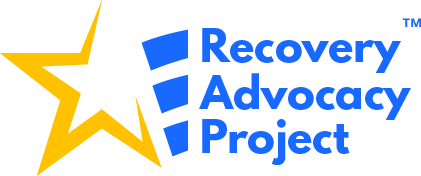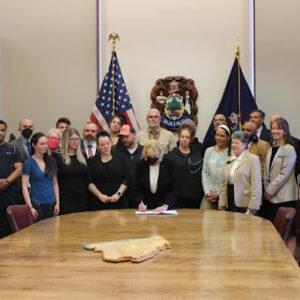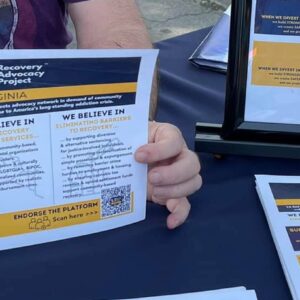Picture it – Las Vegas in July 2019.
Starry-eyed advocates from all over the country trek to the Westgate Hotel and Casino to kick off a national recovery organizing effort. Leaders gather to work together and maximize impact to end America’s addiction crisis. With fire in their spirits and determination on their mind, they take away strategies to organize and mobilize change in their respective communities.
Behind the podium of the Las Vegas Convention Center is one of the many Keynote speakers. Standing before a sea of focused and curious faces, he speaks about diversity, power, privilege, white supremacy and leadership. One audience member, in particular, was enamored with the presentation, yet she also notices something concerning. Her brown eyes scanning the room, she sees a predominantly white audience. The spirit of the presentation and the makeup of the conference participants were not exactly in alignment.
That audience member is Carol Cruz, who is now the Director of Education and Training for Foundations for Recovery and the Chairperson of the recently formed Inclusivity Caucus (IC). On that day in July 2019, Carol realizes that organizer Ryan Hampton notices the same thing in the presentation, and together they were eager to craft a solution. And an idea was born; they wanted to create a safe space for the underserved and marginalized, a metaphoric table where these historically hushed people can sit, speak and be heard. A place where disenfranchised people can finally FINALLY feel safe and respected.
Mobilize Recovery is an initiative of The Voices Project, a grassroots recovery advocacy organization. The intention is to build capacity for organized civic advocacy around the country. Organizers can connect with advocates all over the country by sharing resources, platforms and taking action. Yet, how can folks equitably advocate for those who aren’t on the agenda, are not in the seats, or are not given a stage to share resources that could help people like them?
They can’t. Something needed to be done.
Over the next year, the Inclusivity Caucus began to take shape. As a new Recovery Advocacy Project initiative, the purpose of the Inclusivity Caucus is to co-create and strengthen safe spaces for people of all races, ethnicities, genders, sexual orientations, languages, socioeconomic status, ages, and abilities; to end discrimination, disparities in care, and remove systemic barriers to all who seek support. Further, there is a commitment to make sure that all members, supporters, and partners will always feel a sense of respect, connectedness and belonging.
Thinking back to that presentation before a largely white audience, it is interesting to think if the BIPOC folks in the audience felt supported, respected, or connected? Did anyone ask the opinions of the few BIPOC attendees? Was the space safe for BIPOC and LGBTQIA+ folks? Were they passed the mic at all? Was a seat saved for them at the proverbial table? The wheels turned faster – the Caucus had quite an agenda already.
One of the Caucus’ first initiatives was to mindfully redesign the application to apply for Mobilize Recovery to include information on the details of who a person is. Race, gender, sexual identity and life experiences are JUST as important – if not more – than a degree or project management expertise. An advocate brings every part of them, their culture, and life experiences to their work, and lived experience with recovery is the mystical ingredient that makes an advocate so powerful. In 2019, there were a handful of BIPOC folks in attendance at Mobilize Recovery. In 2021, the number increased dramatically to over 100 individuals by simply redesigning the application and being more mindful in the review process. Such a tiny change made such a meaningful difference.
In addition to the application redesign, the Inclusivity Caucus also rolled out a series of trainings including What is Diversity Equity and Inclusion, LGBTQIA+ Cultural Humility, Unmasking Racism to Create an Anti-Racist Recovery Space, and Culturally Responsive Recovery Support Services.
Picture this – Mobilize Recovery, Las Vegas in September 2021.
In that same conference hall in the Westgate Hotel, the sea of faces includes all shades of beautiful colors, some people had mobility aids, there were folks with disabilities seen and unseen, conference rooms housed workshops focused on dismantling racism in recovery spaces, delivering services to the LGBTQIA+ community and creating culturally responsive recovery support services. In just a short few years, some powerful changes were made thanks to the creation and work of the Inclusivity Caucus.
The IC has no plans on slowing down. In 2022, planned trainings include Access to Equitable Healthcare, Harm Reduction and Peer Support, Building Recovery Friendly Spaces for People Living with Disabilities, and Allyship for Marginalized Communities. For more information on the Inclusivity Caucus, click here.
While there is no finish line or graduation date for inclusivity, there was significant progress made in a short amount of time. The future will be even more inclusive and more diverse. The ripples of which will hopefully spark a journey towards complete inclusivity within the recovery space.

About The Author
Sheilah Powell (she/her/hers) is a woman in long-term recovery and Peer Recovery Specialist and Training Facilitator. She has a BA in Journalism from Rutgers University and is a CPRS and NCPRSS. She entered recovery on December 12, 2015 through a variety of pathways, including 12-step, Buddhist-based pathways, medication, and Harm Reduction. A lifelong native of New Jersey, Sheilah wholeheartedly believes that the journey to recovery and wellness is unique to everyone. A tireless advocate, she serves on various grassroots committees and task forces throughout New Jersey. In 2022, she was featured on an episode of “Here’s To Your Health!” with Dr. Drew. Sheilah is a mother of three children, and she loves the beach, yoga, and her dog.



